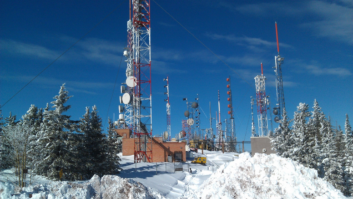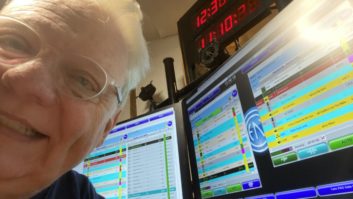PUBLIC INTEREST
Responding to “Why Do We Need Public Files, Anyway?” Feb. 11 issue:
One of the most important aspects of serving the public need isn’t even measured by the FCC: What does a station do when a real disaster or emergency occurs?
Does it interrupt normal programming, cancel commercials and go wall to wall with relevant information? Or does the unattended computer just keep cranking out the hits and spots?
Market size doesn’t seem to matter. Big groups have been guilty of this as they have stretched thin and couldn’t man stations if they wanted to. Many “mom and pop” stations simply don’t have the resources, while stations controlled and fed by satellites are so out of touch with what’s happening locally that they wouldn’t know of a problem until hours if not days later.
Although measuring such coverage in any quantitative way would be difficult, it would be a more meaningful metric to demonstrate that they are truly operating “in the public interest.”
Ken A. Starcher
Cuyahoga Falls, Ohio
LIMIT THE AUTHORIZATION
Dear Commissioner Pai: I read with dismay that Chairman Wheeler is opposed to an application window for AM licensees to apply for FM translators. His view, as I understand it, is that he is opposed to “government giveaways” to special classes of applicants.
The impetus so far has been to open an application window where only AM licensees are eligible. No window will occur with the chairman’s opposition. As an AM station and FM translator owner, I fear that the chairman’s opposition may foil all the hard work you have been doing trying to give AM stations a hand up.
I agree with Chairman Wheeler’s philosophy on this issue, but AM broadcasters need relief! My comments on AM revitalization proposed an FM translator alternative that should be acceptable to Chairman Wheeler, while still providing AM translator help: Don’t limit eligibility to apply; limit the authorization.
Open a window for new and major change FM translators where anyone may apply, but the translatorS that are authorized should be limited to rebroadcasting AM primary stations for perhaps 10 years, or possibly permanently. This will provide the critical lifeline for AM stations, while avoiding the philosophical problem of a “giveaway” to a selected class of applicants.
Licensees can apply for translators and construct them if they have the capital to do so, but many AM licensees have no risk capital available.
Small entrepreneurs like myself could also build translators and lease or sell them to AM licensees for their stations, reducing risk for the licensee. An entrepreneur could perhaps LMA the AM station to be rebroadcast over his translator. There are many scenarios for the ways that third parties may help AM relief.
Please rephrase the AM translator window discussion so that it is no longer a “government handout” but a fair way to issue authorizations.
The plan should help solve a problem, not give away government resources to special interests.
A window for FM translators that may only rebroadcast an AM primary station is redress for the former FCC rule that unfairly banned FM translators from rebroadcasting AM stations until May 2009. Opening the window to all applicants resolves the argument that it is a plum for any special interest.
Edward (Ted) Schober, PE
Consulting Engineer
Radiotechniques Engineering LLC
Haddon Heights, N.J.

KBEW engineer Bill Merrill moves out the Vanguard 1, returning it to Gates in 1977. I DO REMEMBER THE VANGUARD
Loved Ed Montgomery’s story on the Gates Vanguard transmitter of the 1960s (“Remember the Vanguard,” April 22 issue).
I bought one of the first ones in summer of 1966 for KBEW(AM) in Blue Earth, Minn., after receiving an FCC power increase to 1 kW. Stanley B. Whitman was the Gates salesman who convinced me the Vanguard was the finest transmitter ever made, with its single tube.
He also sold Vanguards that summer to Paul Olson at KLEM in LeMars, Iowa, and Bob Reimers at KBRK in Brookings, S.D. I got to know these station owners because the Vanguard 1 turned out to be tough to keep on the air.
I picked up our Vanguard at a freight house in Hannibal, Mo., as Gates could not deliver out of Quincy due to some tax situation. KBEW engineer Bill Merrill eagerly tore out our Gates 250 GY, unwrapped the Vanguard and hooked it up with an electrician on hand. It would not tune our shunt-fed antenna, and after four hours of trying, we hurriedly uninstalled it, putting back 250GY by 6 a.m. sign-on.
The 4CX3000A needed a huge blower to cool and had a huge roar. It ran hot, so hot I spent several hundred dollars redoing ventilation and used it to heat our building in winter. Vanguard needed a non-varying antenna system, which our shunt was not. Thus it shut down quickly during even minor thunderstorms.
In 1976, we needed $100K worth of equipment for an FM in Morris, Minn. Gates and Collins wanted that order. Galen Hassenger succeeded Stan Whitman as Gates sales rep and was pressing hard for the order. OK, I said, throw in a new Gates BC 1H for KBEW, and you’ve got it. Galen said, “They won’t do that.” I said to Galen, “Tell ‘em I’ve operated a Vanguard 1 for 10 years and need relief.” Gates agreed, and that’s how I got rid of my Vanguard 1.
Paul C. Hedberg
Hedberg Group, Retired
Naples, Fla.
LPFM ACTIVISM
Gee, what a shocker! (Not!) Who didn’t see this coming, right?
Even before the recent LPFM floodgate opened, the FM band was already jam-packed just about as tight as it could be, certainly in the larger markets. Then the low-power advocates and licensees were given even more special favoritism by getting elimination of third-adjacent protection/minimum spacing for full-power operators, commercial and non-com alike, and all without having to pay annual license fees like the larger radio broadcasters.
And now the low-power crowd wants less-low power, as well as second-adjacent protection destruction, making a bad situation still worse for the full-power licensees, who invested or paid millions of dollars for their FM signals, and who get billed annually, thank you very much, by the FCC!
Yes, I believe that many LPFM licensees are very genuine and legitimate in their mission of serving segments of the local community whose interests are not being met by the big broadcasters. But we are certainly witnessing politically motivated activists, with a much bigger agenda, who want to keep moving the goal posts in a way that departs further and further from the original purpose of the LPFM service. So, mark my word: Next, the LPFM activists will be asking for full commercial status, to compete directly with the full-power owners and operators who have played by the rules, fair and square, all along. Oh, and, naturally, 250 watts won’t be enough.
Yes, there are true community interests, and then there are special interests, that could care less about operating in the public interest. We need to call an end to their charade and return to a “rule of rules.” Enough with the special interests’ games!
Robert E. Lee
Lee MediaWorks LLC
Austin, Texas

The control room of WBSC-LP, which was completed in April 2015. Hand crafted from cedar in a 19th century former hotel. Harris Oasis console…and yes, you can play vinyl on the air.SMOAK, NOT A WANNABE
I was forwarded a story from your email newsletter about WBSC(LP) in Bamberg, S.C. I was taken aback when I read the statement, “The station is focused on oldies/local information and fulfilling the dreams of its wannabe broadcast manager.”
This comment apparently was directed at station manager Bob Smoak, who was featured in the article linked to the newsletter. Was this a simple poor choice of words or a mean-spirited dig?
“Wannabe,” by definition, is “one who wishes to be/do something but lacks the talent or qualifications.” Sure, I get the whole “using snark to generate clicks” mentality; but Bob is certainly no wannabe.
He visualized his dream of bringing radio back to Bamberg, and didn’t stop working toward that goal until it became reality. WBSC is the very essence of LPFM … giving radio back to the community. LPFM is a direct response to the homogenized chum that has become radio in the last quarter century. Bob Smoak is a 50+-year veteran of the industry, and is a consummate professional. WBSC is generating the kind of community support that many LPFMs can only dream of having. Oh no! A man living his dream. Quick! Tear him down!
Have a look at Bob’s new control room, shown here.
Jack Anthony
President
Fort Mill Community Radio Foundation
Charlotte, N.C.
Editor’s note: Jack Anthony is the contract engineer who helped set up the control room and put WBSC(LP) on the air.
AM NEEDS PROGRAMMING REBOOT
I am still amazed at how many think that AM is already dead and their pet solution to the problem is one size that fits all.
AM has problems in many areas, no doubt, and some type of solution is needed for those situations.
AM has become an afterthought in many markets and the programming reflects that. Solution: Compelling programming. We just did that with a 1KW AM, that we just purchased, and it is working quite well, thank you!
Digital modulation on the current AM band with the IBOC digital modulation scheme is a non-starter for technical and financial reasons.
Migration to VHF is a viable option for those whose situation calls for it. My solution is that those that wish to migrate be given the opportunity to do so.
Those that wish to stay with the current analog modulation scheme should then be given A: More power, and B: Loosened restrictions regarding nighttime skywave interference.
No matter what solution is finally agreed on there will be casualties. Many are just hanging on and this will cause them to cease operation. This is normal business evolution. One-size fits all means only a few get what they really need, and the rest have to make do with what they were given.
R.V. Zeigler
Director of Engineering
Nebraska Rural Radio Association
Lexington, Neb.









